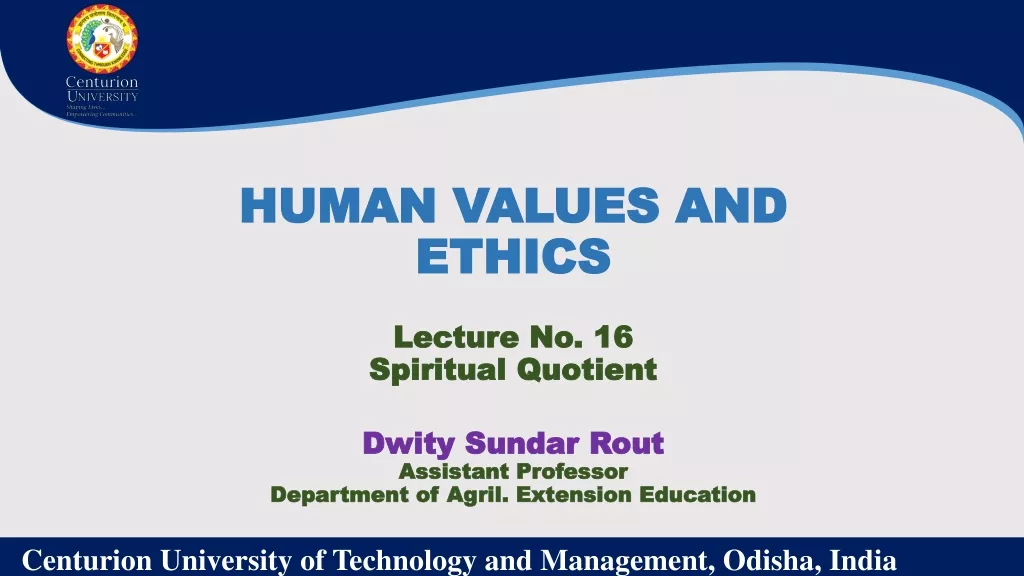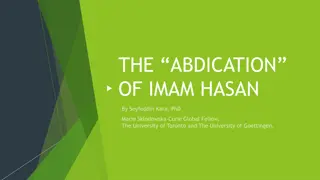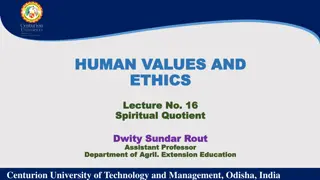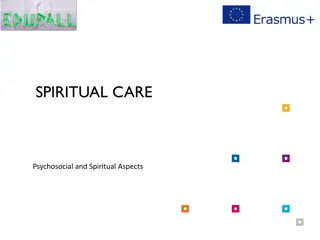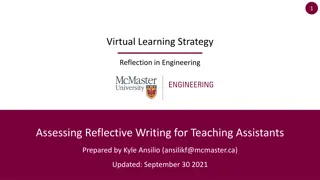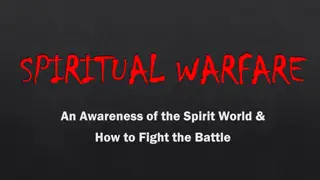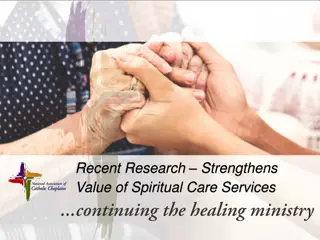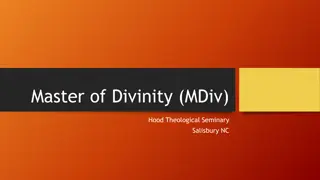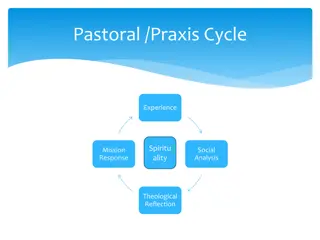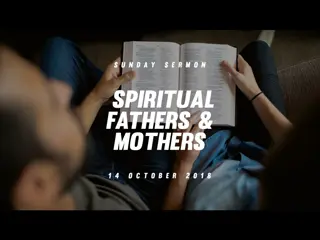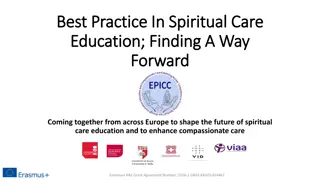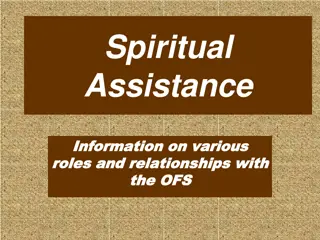Theological Reflection and Spiritual Care Partners
Explore the essence of theological reflection, its connection to faith and action, and how it illuminates our experiences in light of the Gospel mysteries. Reflect on the parables of Jesus, the profound questions of existence, and the deep significance of living a purposeful life aligned with faith and understanding.
Download Presentation

Please find below an Image/Link to download the presentation.
The content on the website is provided AS IS for your information and personal use only. It may not be sold, licensed, or shared on other websites without obtaining consent from the author.If you encounter any issues during the download, it is possible that the publisher has removed the file from their server.
You are allowed to download the files provided on this website for personal or commercial use, subject to the condition that they are used lawfully. All files are the property of their respective owners.
The content on the website is provided AS IS for your information and personal use only. It may not be sold, licensed, or shared on other websites without obtaining consent from the author.
E N D
Presentation Transcript
Theological Reflection Spiritual Care Partners
The Summer Day Mary Oliver Who made the world? Who made the swan, and the black bear? Who made the grasshopper? This grasshopper, I mean The one who has flung herself out of the grass, The one who is eating sugar out of my hand, Who is moving her jaws back and forth instead of up and down, Who is gazing around with her enormous and complicated eyes. Now she lifts her pale forearms and thoroughly washes her face. Now she snaps her wings open, and floats away.
I dont know exactly what a prayer is. I do know how to pay attention, how to fall down Into the grass, how to kneel down in the grass, How to be idle and blessed, how to stroll through the fields, Which is what I have been doing all day. Tell me, what else should I have done? Doesn t everything die at last, and too soon? Tell me, what is it you plan to do With your one wild and precious life?
What is theological reflection? What we do everyday What we should be doing if we pay attention to experience What happens at the intersection of faith and action What faith in living and living in faith produce What Jesus did in the Gospels, especially in telling parables It is, fides quaerens intellectum. ( faith seeking understanding, Anselm of Canterbury)
One Definition of Theological Reflection Theological reflection is the attempt to see and interpret ours and others' experiences (e.g. illness, death, injustice, physical limitations, etc.) in light of the mysteries of the Gospel. It provides a way to "draw nearer" to see into what is there, to "remove one's shoes," before such profound reality in order to behold the fullness of meaning available and to attempt to articulate that explicitly. Theological reflection provides the (formal or informal) context for a believer to notice and articulate the underlying assumptions which grounds one's faith, hope and love. Eileen Flanagan, a Quaker author and teacher, The Wisdom to Know the Difference: When to Make a Change and When to Let Go.
An Exercise: When Things Don t Make Sense Have someone read aloud the Parable of the Good Samaritan on the next two slides. Hear as if you are hearing it for the very first time. Imagine you are one of the characters and hear that person s voice.
Luke 10:25-37 (NRSV) 25Just then a lawyer stood up to test Jesus. Teacher, he said, what must I do to inherit eternal life? 26He said to him, What is written in the law? What do you read there? 27He answered, You shall love the Lord your God with all your heart, and with all your soul, and with all your strength, and with all your mind; and your neighbor as yourself. 28And he said to him, You have given the right answer; do this, and you will live.
29But wanting to justify himself, he asked Jesus, And who is my neighbor? 30Jesus replied, A man was going down from Jerusalem to Jericho, and fell into the hands of robbers, who stripped him, beat him, and went away, leaving him half dead.31Now by chance a priest was going down that road; and when he saw him, he passed by on the other side.32So likewise a Levite, when he came to the place and saw him, passed by on the other side.33But a Samaritan while traveling came near him; and when he saw him, he was moved with pity.34He went to him and bandaged his wounds, having poured oil and wine on them. Then he put him on his own animal, brought him to an inn, and took care of him.35The next day he took out two denarii, gave them to the innkeeper, and said, Take care of him; and when I come back, I will repay you whatever more you spend. 36Which of these three, do you think, was a neighbor to the man who fell into the hands of the robbers? 37He said, The one who showed him mercy. Jesus said to him, Go and do likewise.
Discussion Choose any 3 questions and discuss in groups of 2 or 3: What did you hear? Whose voice did you hear? What did you feel? What are the theological themes you heard? Where was God in this? Where has your faith been challenged? So what? What is different? What was the meaning or purpose of this event?
Why do we do theological reflection? To make sense of human experience To make sense of God s presence in the world To make sense of things like Pain, Suffering, Forgiveness, Grace, Eternity To bring Head and Heart together so that we can move our Feet It is the only way to grow in faith and not fall out of faith.
Tasks of Theological Reflection Theological Reflection: Methods, Elaine Graham, 2005 Induction and Nurture of Members What does it mean to be a Christian? Who am I as a Christian believer? Building and Sustaining the Community of Faith What does it mean to be the body of Christ in this time and place? How are we to live faithfully and authentically? Communicating the Faith to a Wider Culture How is God to be apprehended and proclaimed? What does it mean to preach Good News ? In what ways are Christians called to be signs of God s activity in the world?
Origin in Practical Theology Top-down Theology as in Systematic Theology VS Bottom-up Theology as in Practical Theology It is a matter of Seelsorge (the care of souls) Friedrich Schleiermacher Practical theology is not practice but a reflective theory of practice. (Friedrich Schleiermacher qtd. in Duke and Stone, 1988) Looking carefully at the human story as well as the presence of God in human life (Anderson, 2001).
Ingredients of Theological Reflection Concrete Human Experience Response from People of Faith Context, Culture One s Social Location Sources Scripture, Tradition, Faith, Community Social Science as a Conversational Partner One s Theological Commitments
3 Modes of Theological Reflection Congregational Reflection Academic/ Institutional Reflection Individual Reflection
Overview of Theological Reflection Human Experience Theological Resources Social Location Culture
Human Experience Theological Resources Understanding of God s Presence in the World Response from People of Faith Social Location Culture
The Story of a Sign Video Clip (right click, open hyperlink) https://www.youtube.com/watch?v=8jEGC8 Na-Yg To play the video, right click on the link and click Open Hyperlink or copy and paste the link into your web browser.
Group Discussion Form a small group Choose a reporter and a scribe Take turns talking about the following (15 minutes): The experience of watching the clip (reactions, responses) The meaning of the message (meanings, interpretations) What does it say about the human? (Human brokenness, hope, etc.) The implications for me What does it say about creation? What does it say about God? What do I do?
Sources Anderson, Herbert (2001). Whatever Happened to Seelsorge? Word and World, XXI(1), 32-41. Flanagan, Eileen. The Wisdom to Know the Difference: When to Make a Change and When to Let Go. New York: Penguin Group (USA) Inc., 2009. Graham, Elaine, Heather Walton and Frances Ward. Theological Reflection: Methods. London: SCM Press, 2005. Holy Bible, New Revised Standard Version Schleiermacher, Friedrich. Christian Caring: Selections from Practical Theology. Eds. James O. Duke and Howard H. Stone. Philadelphia: Fortress Press, 1988.





